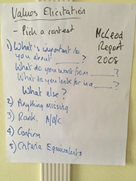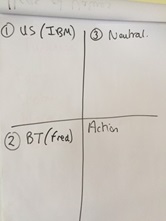NLP Practice Group 17 October 2015 – the content and learnings
Today’s NLP Practice group in London, for people who have completed their NLP Practitioner training, NLP Master Practitioner training and NLP Trainers training, covered four main topics. In addition, two of the 12 attendees had the opportunity to receive some tips and coaching in a coaching circle.
The topics were:
- Values Elicitation
- Using Perceptual Positions in groups
- Identifying whether people are ‘Towards’ or ‘Away from’ simply by listening to their language
- Neuro-logical Levels, in the context of becoming even better at something (being a leader, manager, coach, athlete, parent etc).
The first topic we covered was ‘Values Elicitation’. The group were able to practice eliciting and using Values in a context of their choice, for example selling, relationship coaching and managing/engaging staff. As well as eliciting Values, we covered eliciting ‘criteria equivalents’ (i.e. how would the ‘client’ know that the Value has been met?). One of the delegates used a method that I hadn’t heard of to do this. He simply asked, “what would you be seeing, hearing, feeling, to let you know the Value had been met?” After the exercise we discussed some of the practical uses of Values.

The second topic was a brief discussion about using Perceptual Positions with groups. We discussed having groups of between 4-6 people with a common situation, for example an account management team (at, for example, IBM) looking to improve the relationship with a particular client (Fred at BT). The group would divide a flipchart into four quadrants, with positions 1, 2 and 3 in a separate quadrant, and ‘action points’ in the fourth quadrant (see the picture below). The group would ‘wear’ the appropriate hat and write the key comments/perspectives in the relevant quadrant. This involves the whole group, and uses the key representational systems (visual, auditory and kinaesthetic, and possibly auditory digital). Some key points were:

- The importance of the group understanding the process and buying into it. The facilitator could link the process to the group’s goals, and use stories of where he/she previously used this process successfully.
- The importance of ‘breaking state’, in other words really putting on the ‘hat’ of position 1, 2 and 3. This could be assisted by personifying both someone at the client (position 2) and the wise observer (position 3).
A variation of the process could be using The ‘Disney’ pattern with a group (dreamer, realist, critic and production room).
The third topic was the linguistic indicators of Towards and Away From. The group briefly discussed these indicators:
Towards: words/ideas such as goals, targets, ideas stated in ‘positive’ terms, achieve, get/obtain.
Away from: words/ideas such as negations, ideas stated in ‘negative’ terms (don’t want to …), Modal Operators of Necessity (must, ought, should, have to,).
The final topic was how to use Neuro-Logical Levels to become even better at a specific area, for example, leadership, management, coaching, being an athlete. Each pair marked the ‘levels’ in a line on the floor (Environment, Behaviours, Capabilities, Beliefs/Values, Identity and Mission/Purpose), and considered their specific area from each of the six perspectives. A couple of groups finished early, and decided to re-visit the exercise, but with the six levels arranged in a circle rather than a line. They found that going through the exercise a second time with the levels in a ‘continuum’ rather than a line enabled them to gain even greater insights. This was a useful learning for me and the group.
The final 20 minutes involved two coaching circles; one with a delegate who wanted some input into how to coach a client who had concerns about doing presentations, and the other with a delegate who wanted some insights about how to motivate a particular member of staff. Both groups found the brief session useful, gaining insights from the different perspectives brought by the other members of the circle.
The next NLP Practice Group is Saturday 30 January 2016, 9.30 to 1.30, at the Danubius Hotel, St John’s Wood, London NW8 7JT.






